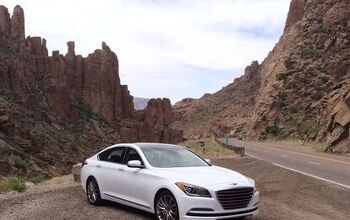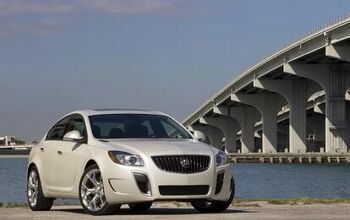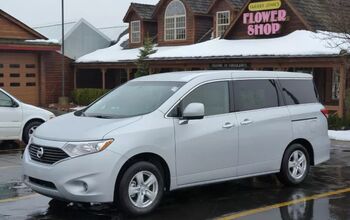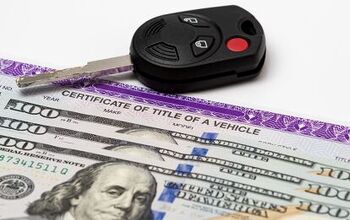TTAC's Best and Worst Cars Of 2021

It’s that time of year again – time for our best and worst cars of 2021. Chris and I are the ones who most consistently get test cars, so it will be just the two of us putting our heads together. We’ve each picked one best and one worst car, as well as a few that deserve a mention either way.
Tim:
My best car is actually a truck, and (spoiler alert) Chris and I agreed on the vehicle that should get the nod. Try as I might to come up with an alternative, I found the Ford Maverick to be the best new vehicle I drove in 2021.
The little truck just does everything well. It’s very good on-road, can tow and haul well, can go off-road (a bit), offers a hybrid powertrain, and is affordable. Ford hit a winner with this one.
Honorable mentions go to not one, not two, but three other Fords – the Ford Bronco Sport, Ford Bronco, and Ford Mustang Mach-E. While my first drive of the Bronco Sport came in 2020, I got significant time with both engines in 2021 and came away impressed – and the Badlands can do more off-road than I’d ever expected. As for the full-size Bronco, well, Ford got it right and will be giving Jeep some sleepless nights.
The Mach-E shouldn’t have the Mustang name, but otherwise, it’s a pretty good overall package, and I think it will help usher the market towards EVs.
As for non-Fords, I liked the Jeep Wrangler 4XE a lot, and the same goes for the Hyundai Santa Cruz. The 4XE adds silent torque to the Wrangler experience, while the Santa Cruz is a delight to drive, even if its utility doesn’t match the Maverick. I also dug the performance of the BMW M4 Competition, if not the toothy grille and the annoying seats.
As for the worst cars, I struggled. None of the cars I drove in 2021 were absolutely awful. I found the GMC Yukon to be a bit hard on the eyes, but it does a lot of other things well. Infiniti’s QX80 and Nissan Armada are aging, and the QX80 gave me some electronic fits, but neither one totally sucked.
Nah, the worst I car drove wasn’t actually bad, just disappointing – that’s the Infiniti QX55. Infiniti put a lot of effort into it and came up just a tad short. It’s not an awful vehicle by any means, but Infiniti promised more and underdelivered.
Chris:
Editorman Tim and the powers that be in Toronto have cracked the digital whip, ordering me to write a few lines about the best and worst cars I’ve driven this year. I could loophole my way out of this by talking about the 2012 Chrysler Town & Country with the dying transmission that I sold to Carmax in the spring – or I could deliver sonnets on how our 2006 Chevrolet Trailblazer (creatively known as hashtag Failblazer) has continued to make me dread the sight of my OBDII reader all while I prepare it to be my teenager’s car come spring, but I suppose the idea is to discuss the best and worst NEW cars I’ve driven this year.
Well, as for worst – I’m hesitant to use that term, but the almighty algorithm doesn’t rank stories with the mealymouthed phrase “car that was the most meh” particularly well. My most memorable automotive fail was burying myself deep in the woods with the 2021 Ram TRX earlier in the year – but that wasn’t a failing of the car.
After all, I’ve driven somewhere around 93 different cars this year – not including cars I personally own. Some are better than others, certainly, but if I had to choose one that meets the above definition – I really dislike the Toyota C-HR. So much so that I penned a Deathwatch soon after Toyota revealed the similarly-sized (but traditionally-styled) Corolla Cross. The C-HR (and I realize the irony of this appearing close to the unkillable paid advertisements for the Tundra that plague this entire site) is a weirdly-styled runabout that doesn’t have much rear headroom. It drives … fine, I guess. But there are so many better choices in that price/size range that I just can’t recommend the CH-R.
Now that the bandage has been ripped, let’s consider the best car I’ve driven this year. There are a few new arrivals that I’d seriously consider killing my credit score for.
Runners-up include:
- Toyota RAV4 Prime – the plug-in hybrid family hauler, if you can find one without some absurd markup, is a marvelous package that is probably the best bet for the flyover country eco-conscious until battery technology and charging infrastructure get where they need to be.
- Nissan Frontier – Nissan was overdue to replace the old Frontier (though it was still a damned good little truck) and they’ve built a winner. Good power, good comfort front and rear, and a capable platform on-road and off.
My best car of the year is, oddly, the car that just left my driveway last week. Despite my checkered past with the brand, I’ve found myself obsessively pricing different option packages to digitally create the ideal version for my lifestyle. Further, I’d been checking online inventories of local dealerships for the past couple of months to actually get an in-person glimpse.
You guessed it – the best car I drove in 2021 has to be the Ford Maverick. Yes, some of that comes from my being cheap – the mythical $20,000 MSRP of the base trim that will never actually appear in any dealer inventory is alluring. But for somewhere between $25k and $30k, you can get a comfortable family vehicle that just happens to have an open bed in the back. My too-tall-teens had plenty of room in the back seat of the Maverick behind yours truly and my bride.
Yeah, the interior trim is cheap. No, it’s not as quiet inside as an S-Class. I don’t care. It is an unassuming runabout that does what it needs to do well.
The fuel economy? I haven’t yet driven the 40+ MPG hybrid version, but the more powerful EcoBoost Maverick managed right around 26 MPG in mixed driving during my week, which is more than acceptable.
If Ford can figure out the supply chain, the Maverick will soon be one of the most common sights on our roads. I applaud Hyundai for being first to market with the similarly-sized Santa Cruz, but the value and economy just aren’t there compared to the Ford Maverick.
[Images: Ford, Infiniti, Toyota]

Tim Healey grew up around the auto-parts business and has always had a love for cars — his parents joke his first word was “‘Vette”. Despite this, he wanted to pursue a career in sports writing but he ended up falling semi-accidentally into the automotive-journalism industry, first at Consumer Guide Automotive and later at Web2Carz.com. He also worked as an industry analyst at Mintel Group and freelanced for About.com, CarFax, Vehix.com, High Gear Media, Torque News, FutureCar.com, Cars.com, among others, and of course Vertical Scope sites such as AutoGuide.com, Off-Road.com, and HybridCars.com. He’s an urbanite and as such, doesn’t need a daily driver, but if he had one, it would be compact, sporty, and have a manual transmission.
More by Tim Healey
Latest Car Reviews
Read moreLatest Product Reviews
Read moreRecent Comments
- V8fairy Not scared, but I would be reluctant to put my trust in it. The technology is just not quite there yet
- V8fairy Headlights that switch on/off with the ignition - similar to the requirement that Sweden has- lights must run any time the car is on.Definitely knobs and buttons, touchscreens should only be for navigation and phone mirroring and configuration of non essential items like stereo balance/ fade etc>Bagpipes for following too close.A following distance warning system - I'd be happy to see made mandatory. And bagpipes would be a good choice for this, so hard to put up with!ABS probably should be a mandatory requirementI personally would like to have blind spot monitoring, although should absolutely NOT be mandatory. Is there a blind spot monitoring kit that could be rerofitted to a 1980 Cadillac?
- IBx1 A manual transmission
- Bd2 All these inane posts (often referencing Hyundai, Kia) the past week are by "Anal" who has been using my handle, so just ignore them...
- 3-On-The-Tree I was disappointed that when I bought my 2002 Suzuki GSX1300R that the Europeans put a mandatory speed limiter on it from 197mph down to 186mph for the 2002 year U.S models.























![TTAC'S Ten Best and Ten Worst is Back for 2018 - Get Your Nominations In [UPDATED]](https://cdn-fastly.thetruthaboutcars.com/media/2022/06/30/8801164/ttac-s-ten-best-and-ten-worst-is-back-for-2018-get-your-nominations-in-updated.jpg?size=350x220)













Comments
Join the conversation
Ford is not the only manufacturer with recalls. Eventually Toyota and Nissan will put turbo 4s in the Tacoma and Frontier not something to look forward to for longevity.
I just now saw my first Ford Mavericks being unloaded at my local Ford dealer. They are way better looking in real life then they are in pictures. When you see them you'll think, "Hey, that's a lot of vehicle for the money" The two I saw were pretty low spec, one an XL, the other an XLT, but they really didn't scream "cheap" at all I was very impressed, too bad I have absolutely no need for a truck :(